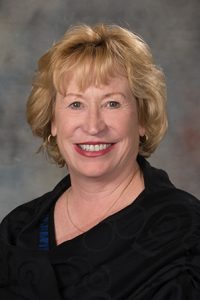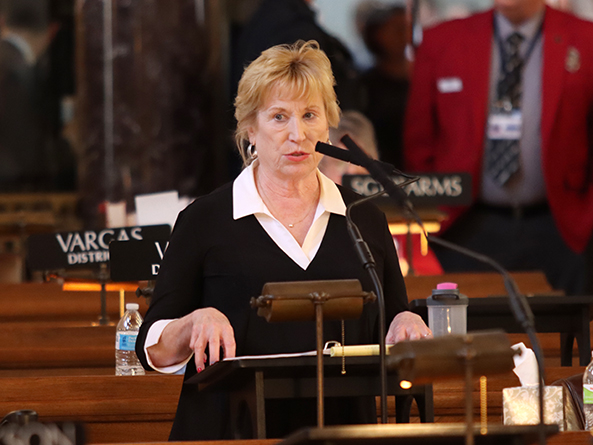Tax credit scholarship bill advances to final round
Lawmakers gave second-round approval April 13 to a measure intended to incentivize donations to organizations that grant scholarships to students to attend private school in Nebraska.

Elkhorn Sen. Lou Ann Linehan introduced LB753 at the request of Gov. Jim Pillen. The measure would allow taxpayers to claim a nonrefundable income tax credit of up to 50 percent of their state income tax liability on contributions made to nonprofit organizations that grant scholarships to students to attend qualifying privately operated elementary or secondary schools.
The bill would cap contributions from individuals, passthrough entities and corporations at $100,000 and those from estates or trusts at $1 million.
The state Department of Revenue could grant $25 million in credits in 2024, 2025 and 2026. After that, if at least 90 percent of the credits in any given year are claimed, the annual limit would increase by 25 percent until reaching $100 million.
The department estimates that the full credit amount would be claimed in the first three years and that LB753 would reduce state general fund revenue by $31.3 million in FY2027-28.
If the annual limit is less than $35 million, a scholarship-granting organization could allocate no more than 10 percent of its revenue for administrative costs. No more than 5 percent of revenue could be used for administrative costs if the annual limit is more than $35 million.
The bill would require a scholarship-granting organization to submit an annual financial report to the department that includes its policies and procedures for awarding scholarships, the number of eligible students receiving scholarships in the most recent fiscal year and other information.
Linehan introduced an amendment on select file, adopted 41-0, that would require scholarship-granting organizations to submit an additional report to the chairpersons of the Appropriations, Education and Revenue committees every other year, beginning in 2027.
The report would include the number of students wait-listed for or denied a scholarship, the dollar amount of scholarships granted and the income level, grade level and geographic location of scholarship recipients.
Under the amendment, a scholarship-granting organization could carry forward no more than 25 percent of its net revenue from one state fiscal year to the next, beginning in 2028. Any amount carried forward would have to be used for scholarships in the following year.
Net revenue remaining at the end of each June in excess of the amount that could be carried forward would have to be used to provide scholarships or transferred to other scholarship-granting organizations by Sept. 30. If not used or transferred, the amount would be remitted to the state’s general fund.
Sen. Jana Hughes of Seward supported the amendment, saying LB753 as introduced would have allowed the credit amount to increase without also requiring a corresponding increase in the number of scholarships granted.
Niobrara Sen. Barry DeKay also supported the amendment. He said the carryover provision would redistribute scholarship funds from low-demand to high-demand areas of the state, ensuring that more students benefit from the program.
He said the additional reporting requirement is an important accountability measure.
“I feel if we are going to grant a tax credit,” DeKay said, “the Legislature should have the opportunity to evaluate where the money is going and how it is being used.”
Sen. Jane Raybould of Lincoln introduced an amendment that, among other changes, would have decreased the cap on contributions and added a provision to prevent annual increases in the credit amount “unless all public education funding obligations of the state are fully funded and disbursed.”
The amendment failed on a vote of 7-28.
After four hours of debate on select file, Linehan filed a motion to invoke cloture, which ends debate and forces a vote on the bill and any pending amendments.
The motion succeeded on a vote of 34-9. Thirty-three votes were needed. Senators then advanced LB753 to final reading on a vote of 33-11.


